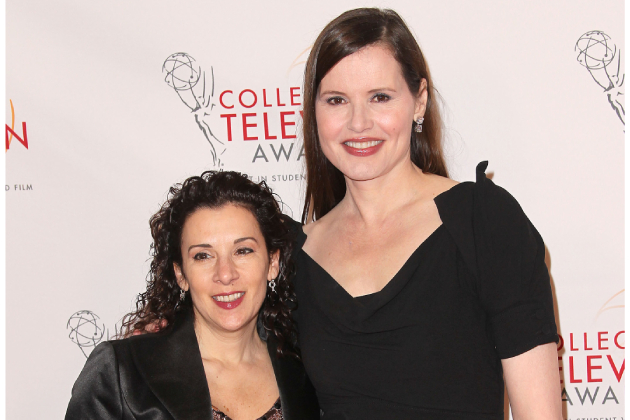NEW ORLEANS — PBS president and CEO Paula Kerger shared her views on the present and future state of public broadcasting and non-fiction programming in a one-on-one keynote at the Realscreen Summit in New Orleans Tuesday (Jan.28).
Eric Deggans (pictured left), TV critic at National Public Radio (NPR), discussed with Kerger (right) PBS’s 50th anniversary, the benefits – and challenges – of working with member stations and the pubcaster’s well-defined documentary strands, among other topics.
Before Kerger joined PBS in 2006, she was hesitant to take on the role, but said public television was entering a “crossroads.”
“Public television is different than any other media organization, not just because we’re non-profits… But also we’re membership organization. We have all these different local stations, 330 of them, and they all are separately owned, separately operated, separately governed,” she said. “They all have their own ideas of what PBS should be, which is both a strength and an interesting challenge.”
Kerger’s lengthy career at the non-profit organization – she is the longest serving president and CEO in its history – falls outside the norm for PBS, Deggans pointed out. Despite the challenges, she said the key is to be realistic about the dynamics of operating in partnership with member stations.
“People are excited about the fact that we’re a media company,” she said. “And they don’t always recognize the other half of our business… There certainly aren’t a lot of locally-based documentary storytellers that have a network to plug into separate from PBS stations… Our stories bubble up from the community.”
When it comes to documentary projects, Deggans questioned how producers can fit their projects into long-running, well-defined PBS documentary strands such as ‘American Masters’ and ‘POV.’
“They’re all a little different,” Kerger said. “We also have a lot of projects that come into us that we affectionately call ‘one-off projects.’ People come to us with great documentaries and if it makes sense to put them with a strand, the advantage to that is that if you’re producing a natural history program, putting it as part of a nature series, you’re putting it with a brand that will bring an audience to your film.”
She added that PBS is rethinking how to organize its schedule in order to bring in more independent filmmakers into the fold, to help people find projects and to help member stations promote it. One example, she says, is the pubcaster’s summer 2020 slate of programming, which commemorates the 100th anniversary of the ratification of the 19th Amendment with documentaries and mini-series.
“There are lots of paths into public broadcasting, and we are and have been throughout our history a significant place for documentary films,” she said.
Deggans shifted the conversation to ask Kerger about PBS’s style of non-fiction.
“There are still big pockets of stories that have not been captured for a national audience,” she explained, adding that PBS is looking for “different forms” of content – including “digital-first” projects such as the pubcaster’s recently announced ‘American Portrait.’
“Ultimately, our goal is to do programming that is entertaining. What distinguishes between what we think about versus what other media organizations think about when making decisions, is that we also look for projects that will be educational,” she says. “If we can do a project that helps you think about the world a little differently, inspires you in some way, then that’s truly a public television product.”
PBS’s innovative approach to programming has made it a launching pad for formats and unscripted series — such as the 1971 documentary An American Family, considered to be the first “reality” series in the U.S. and an inspiration for creators of The Real World — that then make their way into the commercial world in some form. Deggans asked whether PBS has tried to “contain” those innovations.
“Here’s a radical thought… I believe if we inspire people to take our ideas and to build it themselves, that’s great,” she said. “If we’ve helped inspire more great TV, mission accomplished. I view that as a positive, not a negative.”
As PBS looks ahead at the next 50 years, Kerger says the pubcaster is staying true to its “amazing legacy.”
“Our 50th anniversary is a significant one,” she said. “I’m hoping that this is, as we look forward, a period of great experimentation, and the opportunity to look at all of these tools that are at our disposal and figure out how do we actually use them to create the kind of conversations that people want to have, or create the experiences people really, truly desire.
“At the same time, we’re also really focused on what needs to stay the same. Where a lot of companies – and not just media companies – sometimes get in trouble is they become so focused on the new they forget what defined them in the past. For us, it’s the authenticity of the work that we do.”
(Photo by Rahoul Ghose)






























